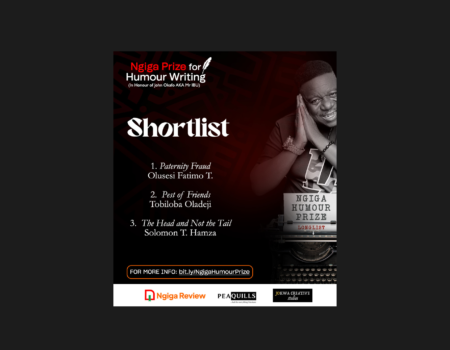Love is built on mutual understanding and trust. These are the core tenets of love, the very foundation upon which it is built. The foundation which holds it up – equips it with the ability to weather whatever storm or test, time has to throw at it. This was the foundation Yejide also built her love upon. But the house in which she had all her love stored, wavered and wavered, even in the slightest of breeze – like a straw house built in a swamp – until finally, it collapsed. It collapsed, because the foundation which was supposed to have been built by two people, was built steadfastly by just one person, with building materials of substandard qualities, provided by the other.
*
PREMISE
Set in Osun, the story follows Yejide – her plights and struggles with infertility in a deeply patriarchal society such as Nigeria. The story tackles topics like gender roles, marriage, and infertility in the society, painting a picture of how it could lead to personal and societal struggles.
The writing style is fluid, seamless. Ayobami used simple diction that was not simplistic – easy to understand, and vividly descriptive – pulling you into the pages of the book, and into the skin of Yejide, so her joys are yours, too.
“When I was a child, my stepmothers would usher their children into bed to tell them stories. But always behind closed and bolted doors. I was never invited in to listen, so I lurked around in the corridor, moving from doors to windows as I determine which woman’s voice was loudest each night. I consoled myself by saying that being motherless meant that I got to pick and choose my stories.”
Her sorrow, laughter, fear, worry… they become yours. The poignant sentences are skilfully crafted, leaving you not only feeling the weights of the words, but also the emotions that roiled in her chest – the guilt, the joy at the birth of baby Olamide, her sorrow at the loss, her bitterness, anger, resentment.
Ayobami delicately balances personal, social, political, and socio-political topics, in a subtle way that still was poignant and apt – without losing track of the story. Once again, I am reminded that the storytelling is so skillfully crafted. The words weave seamlessly into each other, easily building a whole world in your mind’s eye, one sentence at a time.
The books sheds light on the mental effects of deeply wanting to get pregnant, to avoid the ever-judgmental eyes of in-laws always boring holes into the side of your neck, scanning every inch of your body to see in you have put on some weight, looking for anything to suggest that you have gotten pregnant. It really sheds light on the psychological effects of the harrowing situation, and how you wanting to be pregnant so much could lead to a case of pseudocyesis.
- Pseudocyesis: Also known as false pregnancy or phantom pregnancy, is a condition where a woman experiences symptoms and physical changes that mimic pregnancy, but without an actual foetus. This could happen as a result psychological factors, such as emotional distress, anxiety, depression, past trauma or loss – most of which are symptoms present in the protagonist, Yejide.
I like how the book highlights the different forms of misogyny in all its glory – both in its subtle and overt forms, and the how detrimental patriarchy could be, and is, to marriages.
Picture this: A couple battles infertility. A young man and woman. They are both emotionally perturbed, trying to survive this challenge. The man is cancelled out of the equation – he is protected by the society. The society constantly attacks and berates the woman – vocally and otherwise. Remember, never questioning the man’s ability to procreate – he cannot be the problem. She has to be barren. The man gets a new wife. The woman is livid. The woman feels betrayed.
“Yejide, I as a person, I want to praise you. I want to appreciate your efforts to make sure that our son leaves a child when he dies. This is why we know that you will not take this new wife as a rival. Her name is Funmilayo, and we know, we trust, that you will take her as your younger sister.”
The woman goes fasting. She begins to pray fervently, going to numerous pastors, and prophets looking for a miracle. Hoping to take in… anything to wipe the shame off of her face. The man watches her, silent, he knows the truth of what is happening. The woman is used. She feels dirty. She feels shame. She feels guilt. After many, many years, she realized she has been lied to all along. The woman discovers she is not the problem. She never was.
*
CHARACTERIZATION:
The characters are whole – complete, complex human beings with distinct characteristics that sets one apart from the others. Yejide’s determination, Akin’s deliberate obtuseness, Dotun’s lackadaisical nature, Funmi’s pretentious nature. The multidimensionality of the characters makes them very concrete and relatable. Yejide’s mother-in-law, however, fit into the stereotypical narrative of an annoying, overbearing in-law, whose only function is to antagonize Yejide.
*
RUNDOWN:
One of the things I really like, is how the book ends with hope and warmth. A reconciliation, and reunion of mother and child.
“I hold my daughter’s hands, slide my thumbs across over her palms, and feel her pulse. This is not a dream, my daughter is here, standing before me with her back to the classroom…
… ‘Rotimi… Timi, Timi.’ This is all I can say. I count her fingers, running my right thumb and forefinger along their length and stifling the urge to go on my knees and count her toes. I am Thomas, seeking tactile proof of what my eyes have seen before giving into joy. My daughter blinks back tears and smiles.”
I really enjoyed reading this book. Ayobami took me on a really immersive journey, and it seemed, while reading the book, like I was not just reading about Yejides’s story, but I was also living her story. I really love the way it ends with hope – it is reminiscent of a flower growing in concrete. Overall, it is a good book that I think you should add to your TBR list.
Prince Ihè
Prince Ihè is an Igbo writer, and an Applied Biochemist, who lives in Lagos. His writing tackles topics people act like are nonexistent, or are ignorant to talk about. His works have appeared in Brittle Paper Magazine, Kalahari Review Magazine, African Writer Magazine, and elsewhere. He is the Co-founder/Editor-in-chief at Akowdee Magazine, Founding Editor of Ojuju Magazine, and the Fiction Editor at Ụmụọfịa Books and Arts Festival anthology.





